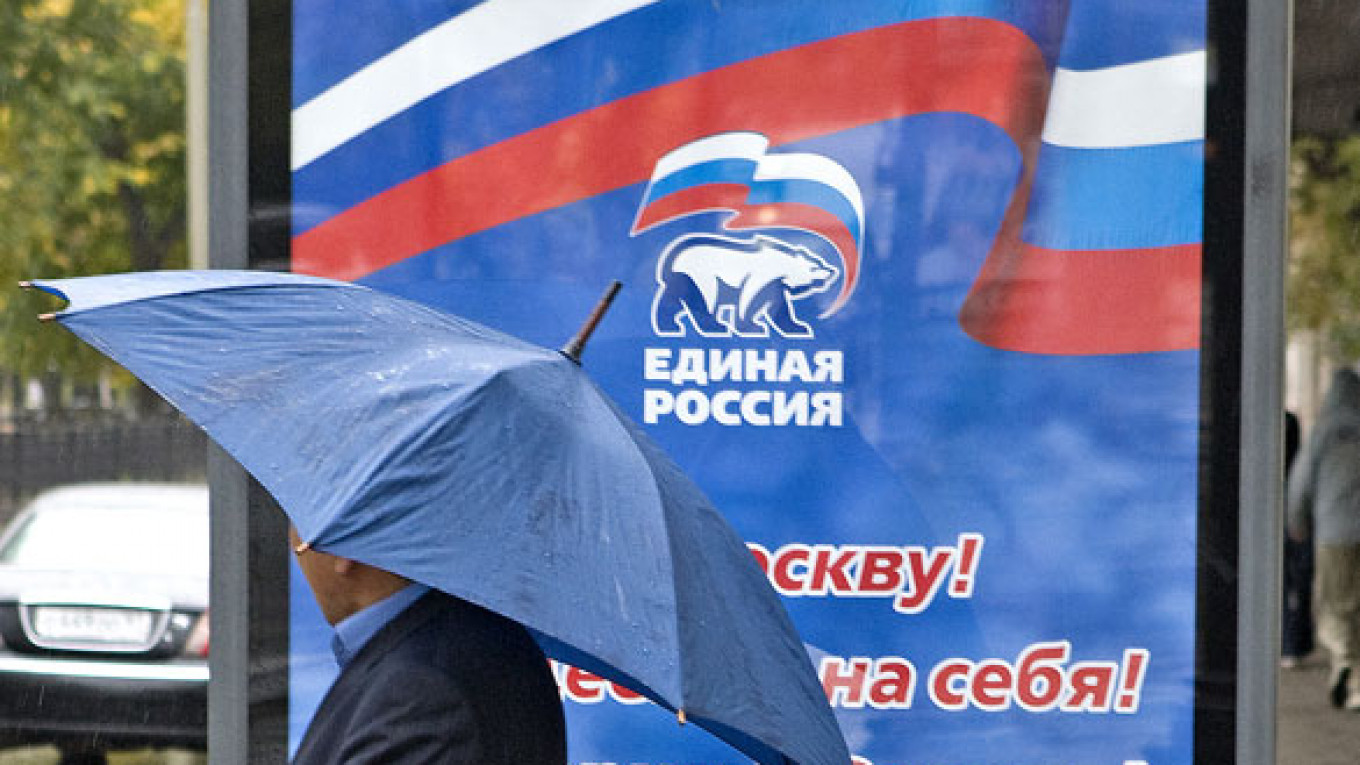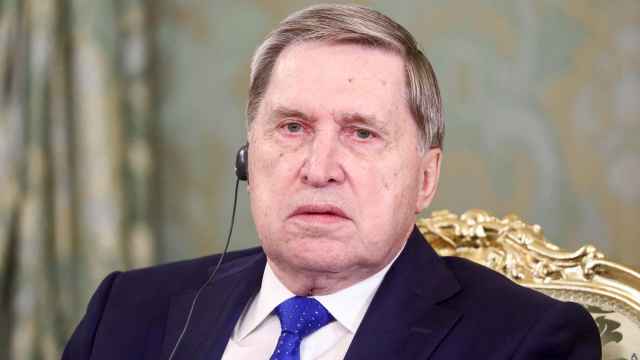Speculation mounted Monday about the future of United Russia following a report that Dmitry Medvedev might assume leadership of the battered party in an attempt to allow incoming President Vladimir Putin to distance himself from the faltering political force.
The move would allow Putin to remain unaffiliated with United Russia — which he is not formally a member of — and instead find backing from his more recently formed People's Front coalition leading to the creation of an alternative political party.
Putin might propose that Medvedev — the presumptive prime minister — take control at the party's upcoming congress in May, Vedomosti reported Monday, citing sources. Putin's spokesman Dmitry Peskov did not comment, only saying it is up to the congress to decide who would become the head of the party.
Medvedev, who is also not an official member of United Russia, led the party during last year's State Duma elections. But this created difficulties for the party, which built its campaign around Putin while Medvedev was associated with more liberal-minded positions.
But analysts questioned whether Medvedev taking command of United Russia would ultimately lead to the creation of a system with two dominant parties since the Kremlin does not intend to lose control over the one "party of power."
"I wouldn't talk about a two-party system because then the party's electoral base is shrinking," Pavel Salin, an expert with the Center for Current Politics, said about the theory that the People's Front — currently a coalition of businessmen and civic leaders — might be turned into a political party for Putin.
The Kremlin has toyed with the idea of creating a genuine two-party political system in the past, backing the creation of the left-wing A Just Russia party under the leadership of then-Federation Council head Sergei Mironov, a former Communist. The party has started to attack United Russia instead, but it does not enjoy widespread support.
United Russia still has a parliamentary majority but suffered a significant defeat in December's Duma elections. Since, it has become the target of attacks from liberal activists who dubbed it the party of "crooks and thieves" — a bumper-sticker slogan popularized by blogger Alexei Navalny.
While the party's popular rating has grown from 42 percent to 52 percent since the elections, the Kremlin does not see it as a strong political force, Salin said.
"It wouldn't be swept away totally. It has parliamentary deputies who are still a strong asset," he said Salin
He predicted that United Russia and People's Front would ultimately act like a single political force.
That position was echoed by Vyacheslav Lysakov, a United Russia deputy who was elected to the Duma through the People's Front.
"Such an idea should be discussed with careful attention, since the creation of such a party might lead to a split," said Lysakov, the head of the Free Choice motorist movement.
Out of 238 United Russia deputies currently in the parliament, 80 were elected through the People's Front, Lysakov said.
Political expert Sergei Markov, of the Plekhanov Russian University of Economics, said that while United Russia might become more liberal under Medvedev, authorities would preserve it from the split.
"The main thing for them is not that it is a party of views, but the party of power," Markov said.
He added that the Russian political elite lives in fear of losing political control over the system.
"It is like a person who saw his house burn down, not allowing anyone to smoke inside," Markov said.
Political expert Iosif Diskin, who took part in founding United Russia, said both Medvedev and Putin do not intend to create "an ideological competition" between two pro-government parties.
He said United Russia might turn more to the left, following a trend in society in which more people are supporting left-wing policies.
"It should become the party of national compromise," Diskin said.
The party's ideological agenda has always been a problem for United Russia. Despite early efforts to present itself as a conservative political force, the party's main feature is its loyalty toward the government and not an ideological agenda.
"United Russia was always trying to embrace a broad range of ideological positions. That was its positive side and its biggest problem," said Vladimir Medinsky a former senior United
Russia deputy who admitted that he looks at the party's future with uncertainty.
A Message from The Moscow Times:
Dear readers,
We are facing unprecedented challenges. Russia's Prosecutor General's Office has designated The Moscow Times as an "undesirable" organization, criminalizing our work and putting our staff at risk of prosecution. This follows our earlier unjust labeling as a "foreign agent."
These actions are direct attempts to silence independent journalism in Russia. The authorities claim our work "discredits the decisions of the Russian leadership." We see things differently: we strive to provide accurate, unbiased reporting on Russia.
We, the journalists of The Moscow Times, refuse to be silenced. But to continue our work, we need your help.
Your support, no matter how small, makes a world of difference. If you can, please support us monthly starting from just $2. It's quick to set up, and every contribution makes a significant impact.
By supporting The Moscow Times, you're defending open, independent journalism in the face of repression. Thank you for standing with us.
Remind me later.






